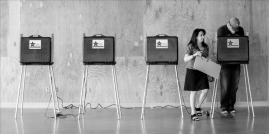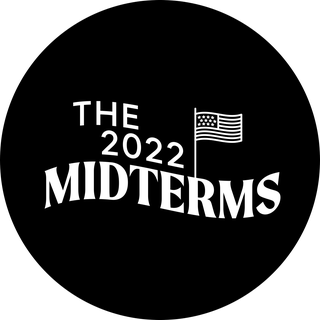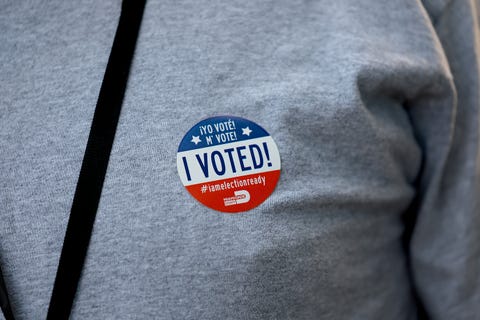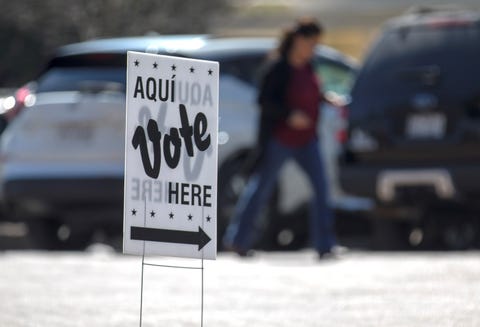Let’s start with the basics. Voting should be easy. Ideally, everyone would do it and not just in the presidential election every four years. Democracy can’t function properly unless everybody, across all demographics, votes. But unfortunately for many people, exercising their civic duty is a complicated and intimidating ordeal. Certain political parties (right now, it’s mostly Republican lawmakers and operatives following in former President Trump’s election-overturning footsteps) desperately want to control who’s allowed, or encouraged, to vote precisely because it’s such a powerful tool to effect change in our country.
Voter suppression efforts, which usually target people of color, low-income Americans, and other already marginalized voters, are nothing new in U.S. politics (please see: grandfather clauses, poll taxes, and voter intimidation, going back to the 19th century). In the past two years (since Biden’s victory in 2020), state legislatures across the country have deliberately made it harder for people to vote. In 2021, a barrage of legislation restricting voting access was passed at the state level—34 laws in total, passed across 19 states—and hundreds more have been introduced across the nation.
And now, in 2022, the same lawmakers who spent last year suppressing the vote have devised a new strategy: Making elections themselves more fragile. Election officials and their loved ones have been threatened and harassed en masse, while far-right election deniers are actively preparing to destabilize the next cycle, with Big Lie believers seeking key roles like Secretary of State (the top election official at the state level) and running in down-ballot elections.
Trump’s lies about his 2020 election loss have become fertile ground for a new wave of voter suppression laws, designed to count out certain demographics with surgical precision. But let’s get on the same page about one thing before we begin: Actual cases of voter fraud are extremely rare, and certainly not substantial enough to indicate a systemic problem or sway an election. Study after study has confirmed this. Election interference and voter suppression, on the other hand, are very real.
Below, I’ll walk you through the impact of voter suppression laws, give you an overview of the states where voting has been restricted, and explain the precautions you can take to ensure your vote counts in the 2022 midterm election. Let’s get into the weeds.
First things first, what’s gerrymandering?
When elected leaders manipulate voting maps to favor their interests, it’s called gerrymandering. That word gets thrown around a lot, because it’s a big problem. To be clear: Republicans and Democrats both do it. Gerrymandering essentially happens on a schedule. Every 10 years, the country undergoes a process of redistricting, in which voting maps are redrawn in accordance with the latest census results. Ostensibly, the goal is to make sure Congress accurately reflects real communities. But when districts have been redrawn to design a voting body with particular priorities (say, an attachment to a local industry or a certain attitude about immigration), one group may become overrepresented while others become severely underrepresented. To understand why this is bad, allow me to point you to the ACLU, which sums it up best: “Voters should choose their elected officials, not the other way around.”
In what states has gerrymandering been a problem lately?
The ACLU is currently bringing lawsuits against South Carolina, Alabama, Louisiana, Georgia, Arkansas, and Ohio for violating their citizens’ voting rights through redistricting. In Ohio, the ACLU claims Republican politicians engineered the latest voting map to secure a supermajority in both of the state’s legislative chambers.
In a suit filed alongside civil rights groups, the ACLU is holding Georgia’s state government accountable for violating Section 2 of the Voting Rights Act. Based on an increase in Georgia’s Black population over the past decade, the ACLU argues, the Georgia General Assembly should have drawn several more majority-Black districts during reapportionment.
You can also track bills affecting the right to vote in your state here.
How do voter ID laws work?
Depending on where you live, you may need to present at least one form of government-issued photo ID in order to vote, even though in-person voter fraud is virtually nonexistent. These laws are also picky about what kind of ID you carry—for example, in Texas, you’re allowed to show a handgun license but not a student ID.
Voter ID laws vary from state to state, but their goal is largely the same: to discourage people from voting. According to the Brennan Center, strict voter ID laws increase the “racial turnout gap” among potential voters. More than 21 million people in the U.S. don’t have a government-issued photo ID, and applying for one costs money, which means that it’s often low-income Americans who are barred from voting.
Why do politicians want to restrict mail-in ballots?
In recent years, we’ve also seen a concerted effort to obstruct mail-in voting, with tactics like “signature matching,” which was the single biggest disqualifier for mail-in ballots in 2016. If the signature on your ballot doesn’t perfectly match the one on your voter registration form, your vote could be discarded entirely. Some officials, like Florida Governor Ron DeSantis, have also pushed to limit the number of ballot drop boxes, making the vote-by-mail process unnecessarily difficult.
Notably, instances of mail-in voter fraud are extremely rare, never amounting to more than a handful of false ballots out of millions, cast over years or decades. Moreover, mail-in voting enables more people to vote, particularly those who might struggle to get to the polls on Election Day.
Can you quickly explain felony disenfranchisement laws?
Thanks to felony disenfranchisement laws, which vary state by state, about 5.85 million Americans are prevented from voting in each election, including those who have already finished serving time. It’s not just as simple as “ex-cons can’t vote.” These laws contribute to an overall pattern where certain demographics are being systematically disenfranchised. Consider this: “If African Americans and Hispanics were incarcerated at the same rates as whites,” explains the NAACP, “prison and jail populations would decline by almost 40%.” Laws restricting who can vote are always targeted—and never fair.
Why hasn’t the Voting Rights Act fixed all this?
The Voting Rights Act of 1965 did make it much harder for states to manipulate the vote, but two recent Supreme Court cases, Shelby County v. Holder (2013) and Brnovich v. DNC (2021), basically gutted the VRA. The John Lewis Voting Rights Advancement Act, named for the legendary Georgia congressman and activist, would undo that damage if passed. Since passing the House by a margin of 219-212 in 2021, the bill has failed twice in the Senate.
The second time it was introduced, the John Lewis Act was part of a package deal. The Freedom to Vote Act, also stuck in policy limbo, aims to make voting more accessible still—the proposed legislation would even deem Election Day a federal holiday so lots of folks could have the day off from work.
What can I do to make sure my vote counts?
Before you vote, make sure you’re registered (and if you’ve moved recently, make sure you’re registered at your new address). Vote.org has a polling place locator, information on how to register, and other crucial resources. If your state allows for early voting, play it safe and vote early. If you’ll be away from home on Election Day, pick up a mail-in ballot instead (get help and instructions here).
If you’ve moved to a new state since the last election, make sure you’re registered to vote at your new address, and get familiar with the voting rules (do you need a certain form of ID? Proof of address?) in your new home. Depending on where you live, you might also have to register all over again before each election, which is of course a huge hassle, but keep in mind that tactics like this one are designed to grind you down until you throw your hands up in resignation. And hey, nolite te bastardes carborundorum, right?
How can I help protect voting rights for everyone?
If you’re pissed by now, so am I. Voting is a minefield, and it shouldn’t be. The good news is that there are lots of great groups devoted to protecting—and expanding—voting rights. Check out the list below and join the fight:
You can also become a poll worker. Election interference can only work if responsible election administrators back down from their roles. Refusing to be intimidated or indifferent makes a huge difference.
Remember, voter suppression tactics revolve around keeping people confused and overwhelmed. You have the ability to defy that. Be a resource for those around you, and make yourself relentless. Because your voice, like your vote, is valuable.
Source: Read Full Article




